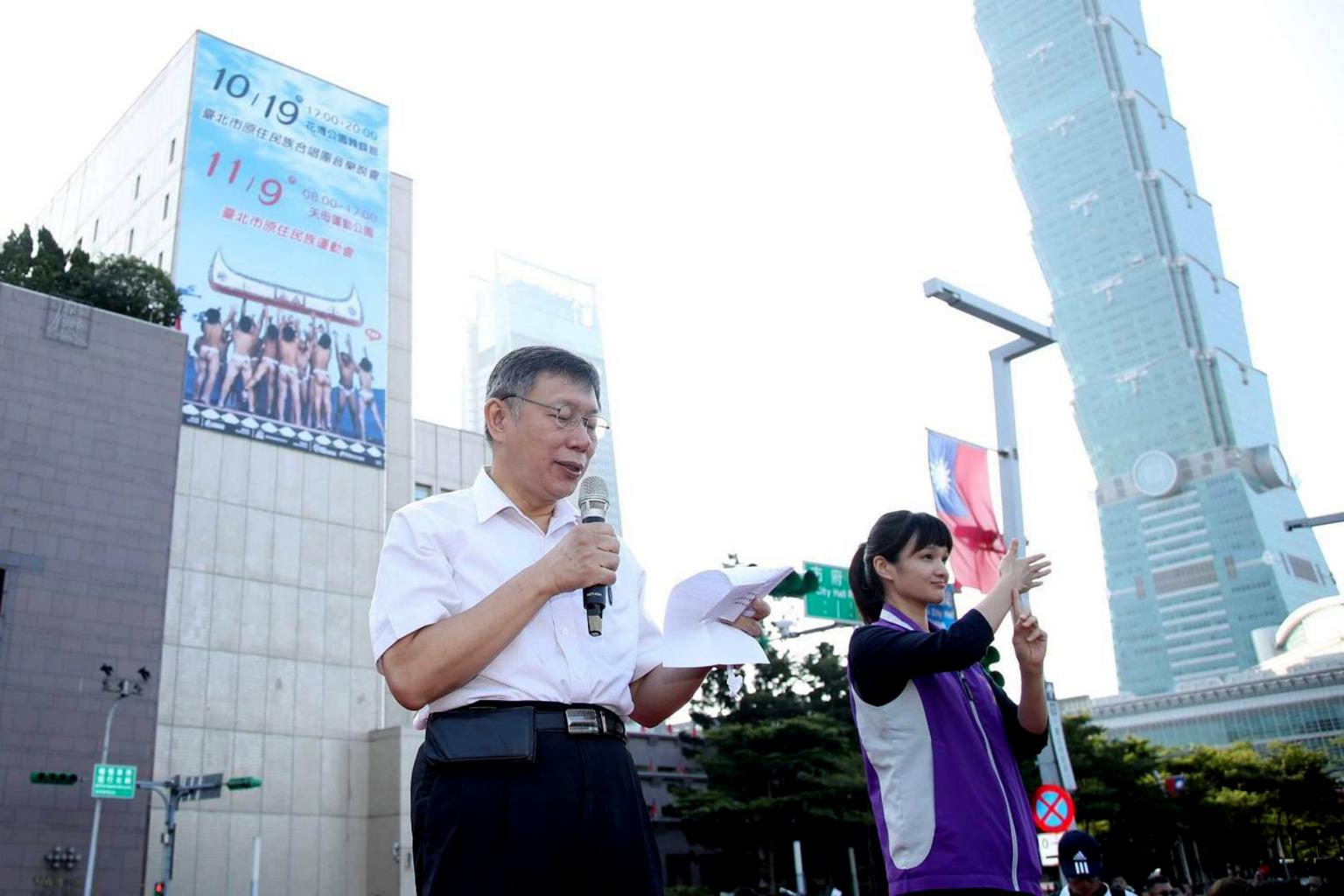Covid-19's unlikely stars: Taiwan's sign language interpreters
Sign up now: Get insights on Asia's fast-moving developments

Taipei Mayor Ko Wen-je and sign language interpreter Ann Chiu at a press conference in Taipei.
PHOTO: ANN CHIU
Katherine Wei
Follow topic:
TAIPEI - Amid the coronavirus outbreak, Taiwan has seen the rise of some stars, such as Health Minister Chen Shih-chung, who also heads the Central Epidemic Command Center (CECC) and hasn't taken a day off since Jan 20, and Minister-without-portfolio Audrey Tang, who oversaw the development of a digital platform to distribute face masks fairly.
Then there is another group of men and women who have been getting considerable attention from the public - they are present at the daily Covid-19 press conferences, standing to one side of Mr Chen, and gesticulating rapidly as the minister and his command centre update the island on the latest developments.
"Wow, look at the sign language interpreter keeping up with the minister," read one comment on the CECC's livestream feed.
"The sign language teacher didn't even bat an eyelid," marvelled another, when the interpreter quickly translated a question from a BBC journalist in English into Taiwan sign language on March 12. The interpreter in question, Mr Lee Cheng-hui, drew the public's attention to the 14 top-level, certified sign language interpreters currently on translation duty for the CECC, as well as serving the Legislature and Executive Yuan meetings that are televised for the public.
"It may look easy... but one minute on stage is 10 years of hard work off stage," said Ms Ann Chiu, 40, a full-time sign language interpreter who regularly translates for the CECC press conferences. She works with Mr Lee, who was unavailable for an interview.
Ms Chiu has over 16 years of experience in sign language translation, and has provided services to government offices, helping deaf people communicate with potential employers and taking video calls to answer their questions about city government services.
She said there are still misconceptions about the deaf community in Taiwan, and a lack of recognition of sign language as its own language, and a necessity for the deaf.
"(Interpreters like us) have been explaining to both government offices and private sectors the need to employ sign language interpreters so the deaf can have the same opportunities as the hearing," said Ms Chiu.
There have been professional sign-language interpreters translating live at Taiwan's islandwide press conferences since 2006, when the National Communications Commission decided its press conferences would always be translated for the deaf community.
The history of live translations - of national day celebrations, presidential inaugurations, election debates and other political events - goes back even further to 2000, to Taiwan's National Double 10th Day ceremony, commemorating a historical event, at the presidential office, which had a sign language interpreter translating government officials' speeches.
The hearing community seemed not to take notice until recently.
"Because (these press conferences) are about everyone's lives and safety, people have been paying more attention. This in turn has the hearing community growing curious about that little square off to the side of their TV screens with the person gesturing wildly, and they eventually find out about the sign language interpreters," said Ms Chiu. "Then they realise, behind these interpreters, there is this whole community of people who rely on this language."
Ms Chiu's colleague, Ms Chiu Hsiang-lin, 45, agreed that the pandemic has given sign language a new opportunity to shine.
"My husband didn't even know that I was signing at the press conferences, but his friends definitely noticed, and they quickly spread the word," she said with a smile.
Ms Chiu Hsiang-lin has been signing almost her whole life as she was born to deaf parents, and received formal training as a professional interpreter in 2002, but the press conferences are difficult for even the most experienced interpreters.
"I was among the first to receive my certification in Taiwan, having taken the training and the test the first year they became available," she said. "But with the pandemic, everything changes so fast - the terminology is difficult, new phrases pop up every day, and we don't get to touch base with the CECC before each briefing."
According to Taiwan's People with Disabilities Rights Protection Act, the municipal and county (city) governments are required to provide sign language translation services to people with hearing or speaking disabilities when they participate in public affairs.

